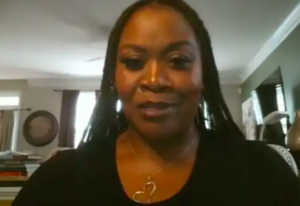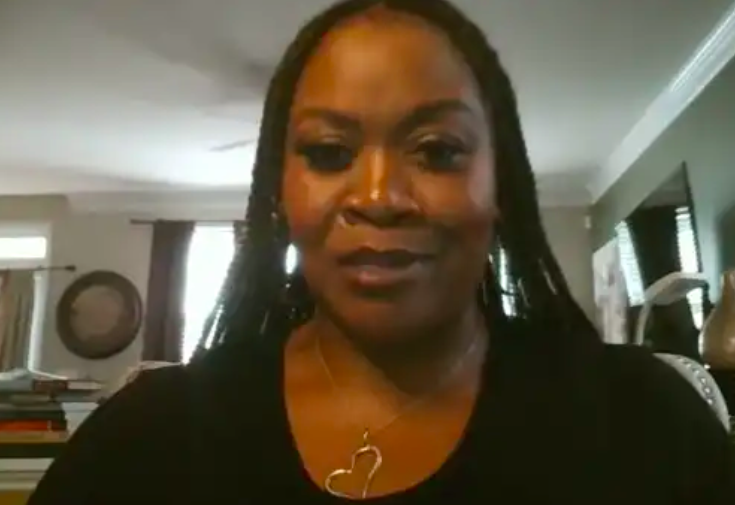This article was published with permission and in collaboration with Prism. You can find the original article here.

Emelia Cowans-Taylor speaks in a Facebook Live about being dismissed from WRAL.
*Photo courtesy of Prism.
After years of what Emelia Cowans-Taylor describes as “racial microaggressions” by management at Raleigh-based WRAL-TV, the 13-year lottery host was fired in August after testing positive for COVID-19. Cowans-Taylor, a communications strategist who has worked as a TV host, producer, and radio personality, believes the termination was an attempt to quiet her after complaints of racial discrimination and what she perceived as a toxic workplace culture.
As she puts it, “My termination is an example of the unspoken biases against Black women.”
Cowans-Taylor was recently joined by others who took to social media with the hashtag #BoycottWRAL. After her viral Facebook Live response to being dismissed, WRAL released a statement saying her contract had not been terminated because of race. According to the statement, “[Cowans-Taylor] went to take a COVID test on August 4, but came to work before the results were made available, never alerting managers that she had symptoms and had taken a test,” which the statement called a “blatant disregard” of the station’s established COVID-19 health and safety protocols.
Cowans-Taylor disputes the public statement, saying that she had felt “run down” after traveling for her father’s memorial service, but had her temperature taken at the station door per their protocol and had not registered a fever. She claims her actions were no different than other employees who had done the same.
“Why would I go to work knowing I was sick? I almost died from the 2009 H1N1 pandemic. They have allowed their mischaracterization of the turn of events to make a Black woman look like a monster,” said Cowans-Taylor.
Two former reporters reached out off the record to share similar WRAL contract termination and work place discrimination experiences. When asked by Prism how racial discrimination complaints are treated, Joel Davis, WRAL vice president and general manager, wrote: “Our VP of Human Resources has been in the role since 2010 and has not received a complaint of racial discrimination by a Black female employee.”
However, Cowans-Taylor provided Prism with an email sent to WRAL dated January 28, 2019, over a year before she was fired, where she describes “years of micro-aggression under [redacted] leadership” that had led to her feeling held to a different standard than her co-workers and “personally attacked.”
“For whatever reason, there is a personal vendetta towards me and I don’t understand why. I do know that implicit bias has a way of showing up in a way that exaggerates the mistakes of people of color and also shames them,” Cowans-Taylor wrote in her email to management. Management responded to the email, which at the time ultimately led to an undisclosed agreement.
In a statement to Prism, WRAL management wrote: “WRAL is committed to reflecting the diversity of our community. Our talented, diverse on-air anchor teams and journalists in every daypart represent the diversity we see in our community.”
After a summer of demands for racial reckoning, industry experts say discrimination in broadcasting persists. Many news organizations decline to share racial and gender profile information. From the Women’s Media Center’s “Status of Women of Color in the U.S. News Media 2018” report: “Indeed, a host of factors determine who’s selected to deliver TV news: journalistic talent, professional connections, age, physical appearance, and more.”
“Biases, deliberate or not, against women who are of color do impede their efforts to get ahead,” said Dorothy Tucker, reporter at a CBS Chicago affiliate and vice president for broadcast with the National Association of Black Journalists.
Veteran journalist Kesha Monk has worked in broadcast in Boston, Chicago, Los Angeles, New York, Pittsburgh, and Raleigh; including a syndicated radio show with former American Idol judge Randy Jackson. Monk said she’s often been relegated to “urban markets” and enjoys the genre, but wishes she’d had the opportunity to do more.
She identifies with Cowans-Taylor’s experiences. “One time while working in Pittsburgh playing a lot of Black music, they asked me to change my delivery style to appeal to their demographic of white women, ages 25 to 54,” she explained. “You listened to my demo and hired me because you liked what you heard. That’s why they call it a radio ‘personality.’ I am a Black woman, playing Black music, but you want me to change my personality?”
Former Turner Broadcasting Network/CNN media producer Ebony Hillsman left the Sunshine State to work in Atlanta, noting the “culture shift” from Central Florida where there was often only one Black TV anchor. “When I worked in TV as an associate producer, one of the biggest complaints was how the Black women looked,” said Hillsman. “It was always about how the women looked. ‘Why did she wear her hair like that?’”
Cowans-Taylor has also been a part of Black Women’s Roundtable, a national organization that supports the CROWN Act, a bill to ban discrimination based on hair textures or styles. The legislation is of particular concern in the appearance-driven broadcast industry, where a Black woman’s hairstyle is more likely than a white woman’s to be perceived as “unprofessional.”
But discrimination isn’t limited to hair or television. In the report, “How whiteness dilutes voices of color at public radio stations,” Laura Garbes explores the racialization of sound in public broadcasting, interviewing 70 people of color who have worked at National Public Radio member stations across America.
Garbes writes: “As one employee from a local affiliate told me, ‘Whenever we do public-facing, marketing things, it’s very much signaling to a college-educated, middle- to upper-class white audience.’ This orientation reverberated as a common theme across local member stations.”
This was the case for Texas-based former NPR reporter DaLyah Jones, who recalls feeling targeted by professors, coworkers, and listeners for her accent and dialect.
“People always picked on me because I was from the ‘boonies,’ but it stuck with me when one of the journalism professors said, ‘You should go to Iowa to neutralize your accent.’ He didn’t realize he was demonizing the way I talk,” Jones said.
Jones, who considers herself a movement journalist, shares local stories that she does not believe would have been likely to run in her time at NPR. Garbes’ report appears to support Jones’ suspicions, noting that: “NPR has been self-critical about its diversity efforts: A 2018 report found 83 percent of all voices on weekday news programs were white, and 67 percent were male. The network has made explicit efforts to increase diversity in the newsroom. However, there has been less sustained attention on the experiences in local newsrooms.”
Today, at 25 years old, Jones enjoys working in spaces led by people of color and describes her on-air style as “southern, East Texas charm,” unapologetically using slang when writing or broadcasting. She points to news industry heroes who have made that possible, along with Texas-born sound warriors like Solange, Beyoncé, and Megan Thee Stallion. Jones says she’s less concerned about impressing a conservative, white demographic: “I am not trying to be neutral. I am trying to be me, so I do things like talk shit on Twitter. That’s how we show love. ”
Monk was inspired to share her experiences after seeing Cowans-Taylor’s Facebook Live post noting the importance of being in control of her own narrative and the pressures to “sell out” to advance one’s career. After battling cancer three times, Monk is clear about her future. “After 25 years in radio, I have already proven I can do it. Even through being very ill—› almost having cancer rob my voice, not being able to talk, losing my teeth—I said, ‘You know what? I know I’ve touched a lot of lives.’ … I can’t just go away.”
Cowans-Taylor agrees that giving up isn’t an option. She said dozens of Black women have come forward to share their stories about microaggressions in broadcast newsrooms since her Facebook Live.
“This was never about money. This is about what is right and what is wrong,” she opined. “My story is the story of EVERY disregarded Black woman. There isn’t one of us walking this earth who doesn’t know the hurt and sting of being thrown away for having the audacity to demand equity.”

There are no comments
Add yours